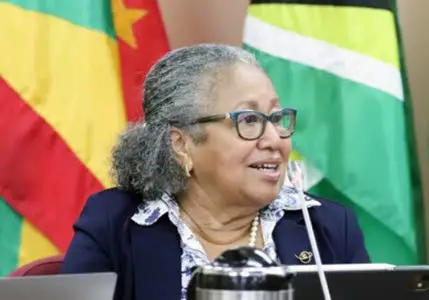GEORGETOWN, Guyana — As global economic pressures mount and trade dynamics shift unpredictably, ministers of trade and economic development across the Caribbean Community (Caricom) convened this week to re-evaluate the bloc’s regional and international trade strategies.
The high-level gathering, taking place over two days in Georgetown, comes at a time when the region faces intensifying tariff regimes, supply chain uncertainties, and sluggish intra-regional commerce. At the heart of the discussion: how to reposition Caricom economies for resilience and competitiveness in a fast-evolving geopolitical climate.
Dr. Carla Barnett, Caricom’s Secretary-General, opened the 60th Council for Trade and Economic Development (COTED) by calling for a deliberate pivot in the region’s trade posture. “The current climate underscores an urgent need to diversify both our trade partners and our export base,” she said. “We must deepen integration within the region while simultaneously cultivating new strategic alliances.”
The urgency is not abstract. Heightened trade restrictions, particularly from the United States, have placed a disproportionate burden on Caribbean economies. In some cases, such as Guyana, newly imposed tariffs have reached as high as 38%, straining export viability and undercutting regional revenues. These moves—largely linked to shifting U.S. economic nationalism—have brought latent vulnerabilities to the fore.
Yet Barnett emphasized that internal recalibration is just as necessary. “We cannot continue business as usual,” she warned. “Legacy issues of non-compliance, trade bottlenecks, and policy inertia must be tackled head-on.”
Key items on the table during the session include the finalization of the updated Common External Tariff and a refined framework for the Community’s Rules of Origin—both instrumental tools for enhancing regional value chains and reducing extra-regional dependency.
Intra-regional trade, often heralded as an untapped growth lever, remains stubbornly underdeveloped. According to the Caricom Secretariat, much of this is due to fragmented regulatory environments and inconsistent enforcement of trade commitments among member states.
To address this, Barnett is urging the adoption of a new Regional Industrial Policy. “This can be transformative,” she said. “But only if it is operationalized with urgency and focus, particularly around entrepreneurship, manufacturing scale, and market access.”
Equally vital is institutional coordination. The Secretary-General stressed the need for consolidated efforts between the Secretariat, the Caribbean Development Bank (CDB), and private sector actors like the Caricom Private Sector Organization (CPSO). Their collaborative research and trade policy analysis, she noted, are forming the foundation of smarter advocacy in the face of global headwinds.
Barnett also acknowledged CPSO’s ongoing role in navigating the complexities introduced by the “America First” doctrine, which has led to heightened scrutiny on Caribbean shipping lanes and maritime logistics.
In her closing remarks, Barnett challenged ministers to fully leverage the tools embedded within the Revised Treaty of Chaguaramas—the legal backbone of Caricom integration. “The flexibility is there,” she asserted. “What remains is the political will and execution discipline to act decisively.”
With numerous trade protocols near completion and others at critical junctures, the tone of the summit was clear: Caricom must now choose between maintaining the status quo—or architecting a new trade reality on its own terms.

